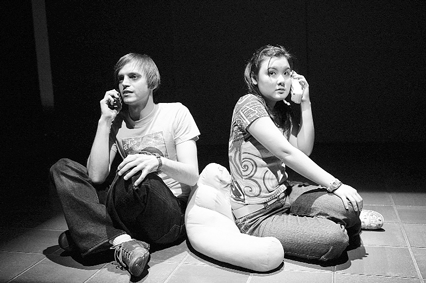Julia Cho’s play falls short in conveying Asian-American anxieties
In Julia Cho’s sometimes engaging hodgepodge of a play, “BFE” at Playwrights Horizons, her central character, 14-year-old Panny (Olivia Oguma), an Asian-American, has a lot to deal with. At an early age, her father deserted her and her mother, Isabel (Kate Rigg), who is neurotic, housebound and obsessed with her daughter achieving an impossible ideal of physical beauty. Panny’s uncle, Lefty (James Saito), is something of a father figure for her, but not much of one, absorbed as he is in Dungeons and Dragons and a burgeoning affair with a black woman, Evvie (Karen Kandel), he meets at the mall where he works as a security officer. And, to top things off, a number of adolescent girls––all blonde and pretty––in Arizona (the “Bum Fuck Egypt” of the play’s acronymic title) have been mysteriously abducted.
Panny, of course, is touched by this horror, but this plot element seems a rather cheap, clichéd and easy gambit to lend dramatic urgency to an already charged emotional situation. All the characters seem to be searching for some kind of love, but, by the play’s finale, no happy endings are guaranteed, although some rapprochements are achieved.
Some major miscasting inevitably dissipates the effect of Cho’s work. Panny’s feelings of being unattractive are not helped by her mother’s urging her to have plastic surgery in order to be like one of the pretty white girls, some of whom are those who wind up missing. Oguma happens to be quite attractive, with a doll-like prettiness that belies her character’s low self-image. Cho has her applying makeup for the first time, and being stymied by the instructions to apply shadow to the crease in her upper eyelid, which supposedly doesn’t exist. But the conceit utterly fails because Oguma is too obviously in possession of the so-called “double eyelid” for which some Asians, pursuing a more Western look, undergo a plastic surgery known as blepharoplasty.
If Oguma’s acting were sharper, this physical discrepancy wouldn’t matter so much, but all she comes up with is a consciously assumed adolescent guise more off-putting than worthy of empathy. The actress is also hobbled by Cho’s irritating fourth wall-breaking device of having her character directly address the audience, not to mention that callow device of Panny’s declaiming certain words, like “doppelganger,” followed by Webster Dictionary definitions to urge along the exposition along.
What are dramaturges hired for, anyway?
This doppelganger appears in the form of Panny’s Korean pen pal, Hae-Yoon (Sue Jean Kim). Kim endows her character with a sprightly energy, but the humor engendered by her Korean accent and desperate attempts to sound like an American has a forced, cutesy feel to it (Margaret Cho redux). If the very Korean-looking, quite sympathetic Kim had played Panny, this play would have worked a lot better.
Cho’s strengths as a writer appear in intimate dialogue scenes in which lonely souls, like Lefty and Evvie, or Isabel and a pizza boy she tries to seduce, attempt to connect. Kandel, while a tad over-eager, makes Evvie’s reaction to Lefty’s clumsy expression of love a moving thing, while Rigg is deliciously comedic, doing much to redeem her sketchily conceived character.
The male cast standout is funny Jeremy Hollingworth, who plays that delivery boy, as well as General Douglas MacArthur in some fantasy scenes with Isabel. James McMenamin, however, is a poor choice as Hugo, a 20-year-old Mormon, with whom Panny strikes up a telephone romance.
Saito, as ever, is workmanlike, but does not stir; he is almost too well-cast as the simp Lefty.
Gordon Edelstein’s direction is at times clumsy, as when he has cast members not involved in scenes sitting on the sidelines in full audience view or uses that tired opening device of having Isabel and Lefty already seated onstage as the theater fills with audience. The scenes involving that scary kidnapper (the scary Scott Hudson) lose much of their impact because of the onstage presence of the family couch.
gaycitynews.com



































